Im Rahmen der Veranstaltung „Curricula entwickeln mit KI und anderen Tools“ von e-Teaching.org durfte ich einen Workshop zu „MOOCs im Curriculum und das vielleicht auch noch KI-gestützt?“ gestalten. Hier gibt es noch meine Folien nachgereicht:
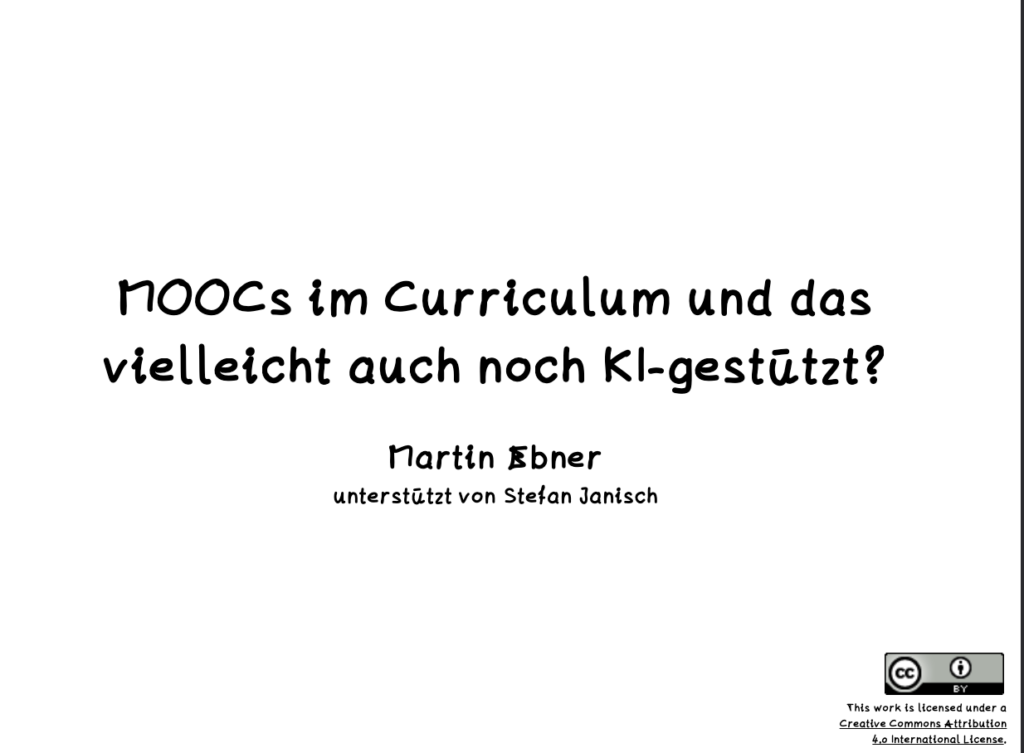

Digitale Lehre an und rund um der Technischen Universität Graz
Im Rahmen der Veranstaltung „Curricula entwickeln mit KI und anderen Tools“ von e-Teaching.org durfte ich einen Workshop zu „MOOCs im Curriculum und das vielleicht auch noch KI-gestützt?“ gestalten. Hier gibt es noch meine Folien nachgereicht:

In Rahmen des KI-Labs im Sommer 2025 in Münster haben wir rund um mögliche sinnvolle KI-Anwendungen in der Hochschullehre diskutiert und diese dann gesammelt:

Wie lassen sich KI-Technologien künftig sinnvoll in Lehr- und Prüfungsprozesse einbinden?
Diese Frage stand im Mittelpunkt des ersten KI-Labs des HFD, das im Juli 2025 in Münster stattfand. Über 40 Expert:innen und Entscheider:innen aus Hochschulen, die sich strategisch mit dem Einsatz von Künstlicher Intelligenz befassen, arbeiteten dort gemeinsam an praxisnahen Lösungen. Martin Ebner und Sandra Schön von der TU Graz berichten, welche Ideen für KI-gestützte Lehr- und Lernanwendungen sie mit ihren Kolleginnen und Kollegen von anderen Hochschulen entwickelt haben.
Zusammenfassend ist daraus dieser Bericht entstanden der jetzt vom Hochschulforum Digitalisierung veröffentlicht wurde: [Link zum Bericht]
Find here our slides from the presentation of our paper, „Prompting.School: Teaching AI Literacy through Guided Prompt Engineering Practice“ at
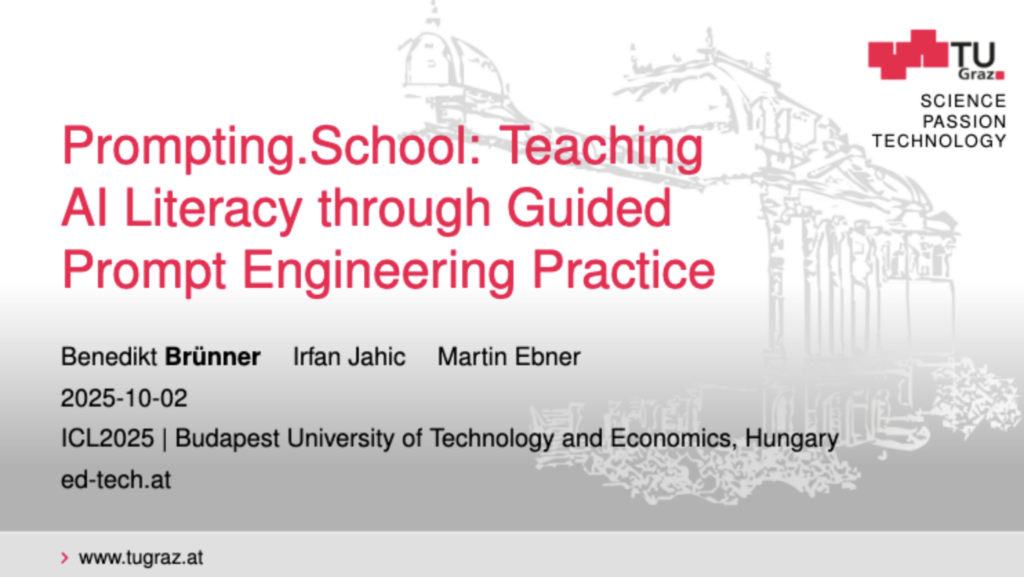
Find slides right here.
If you are interested in the prompting.school – you can use it for free, too [link to prompting.schule]
This is an impactful contributions, methodological rigor, and exceptional novelty in the research field of AI in education.
Find here our slides from the presentation of our paper, „Insights into Teachers‘ Use of Generative AI and the Influence of Contextual Factors on Fostering Self-Regulated Learning in Secondary Education“ at
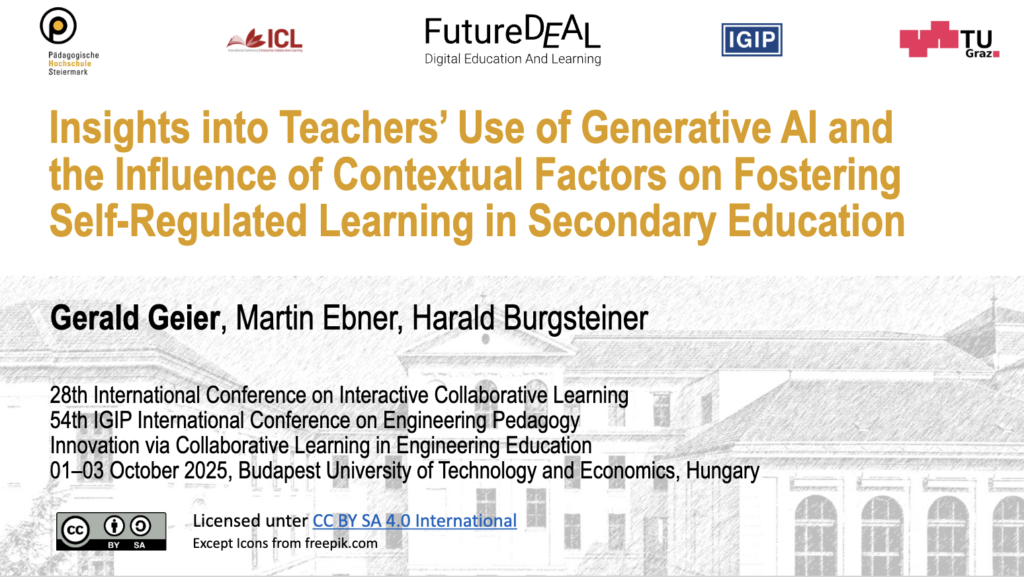
Find slides right here.
At this year’s ICL conference in Budapest, one of our presentations was about „Developing and Testing a Peer-Review Process for Content Quality Assurance in MOOCs: A Case Study on an E-Assessment Course„
This contribution presents the development and testing of a peer-review process for content quality assurance in MOOCs, implemented in the course “E-Assessment – auf Kurs gebracht”. The process was evaluated regarding complexity, duration, collaboration with external reviewers, and learners’ perception. Results show that the procedure can be smoothly integrated into MOOC development. Reviewers contributed beyond expectations by providing materials, didactic advice, and legal-ethical reflections. Learners rated the videos (very) positively (92.7% positive ratings, 100 participants, n=812 answers), especially for structure and coherence. Slightly lower ratings for ‚visual appearance‘ and ‚use of supportive linguistic elements‘ can be explained by the course’s retro video de-sign and the viewers’ understanding of how linguistic devices can be effectively used in educational videos. The study confirms peer review as a feasible and effective quality as-surance approach that supports both collaboration and content improvement.
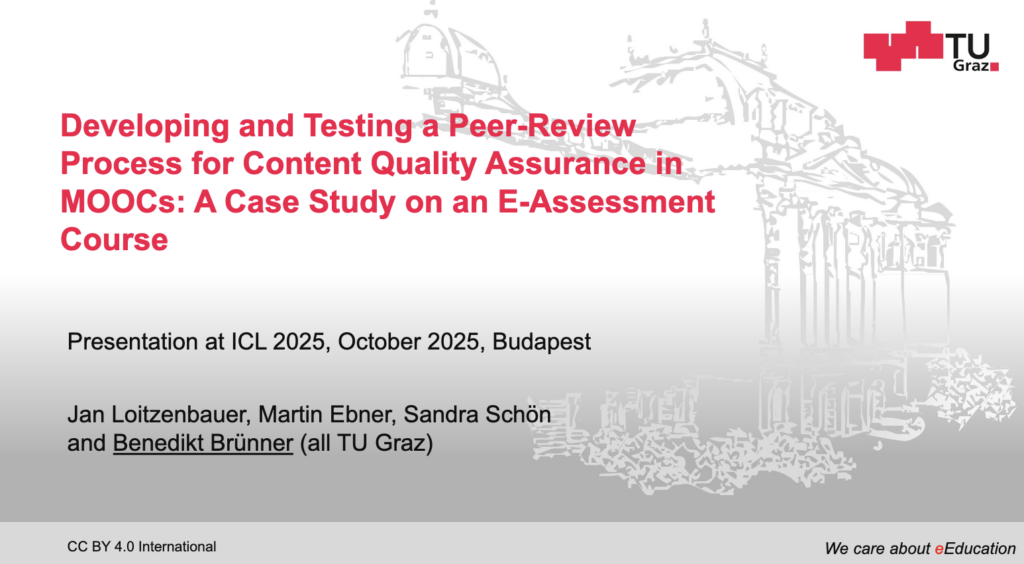
Find the slides in TU Graz repository.
Es ist wieder soweit, wir dürfen im Rahmen der Welcome Days unsere Studienanfängerinnen und -anfänger heute wieder an der TU Graz begrüßen. Heuer in einem gänzlich neuen Format, vor Ort, im Hörsaal und am Campus mit Festivalcharakter. Wir sind mindestens so gespannt wie unsere Studierenden wie gut es klappen wird. Hoffen wir also auf gutes Wetter, dann kann es wohl nichts Schöneres geben als in Graz sein Studium heute zu beginnen.
Dazu gratuliere ich herzlich und freu mich, dass wir wieder ins neue Semester voller Energie starten können.
Ahja, alle Infos gibt es natürlich hier: Welcome Days TU Graz
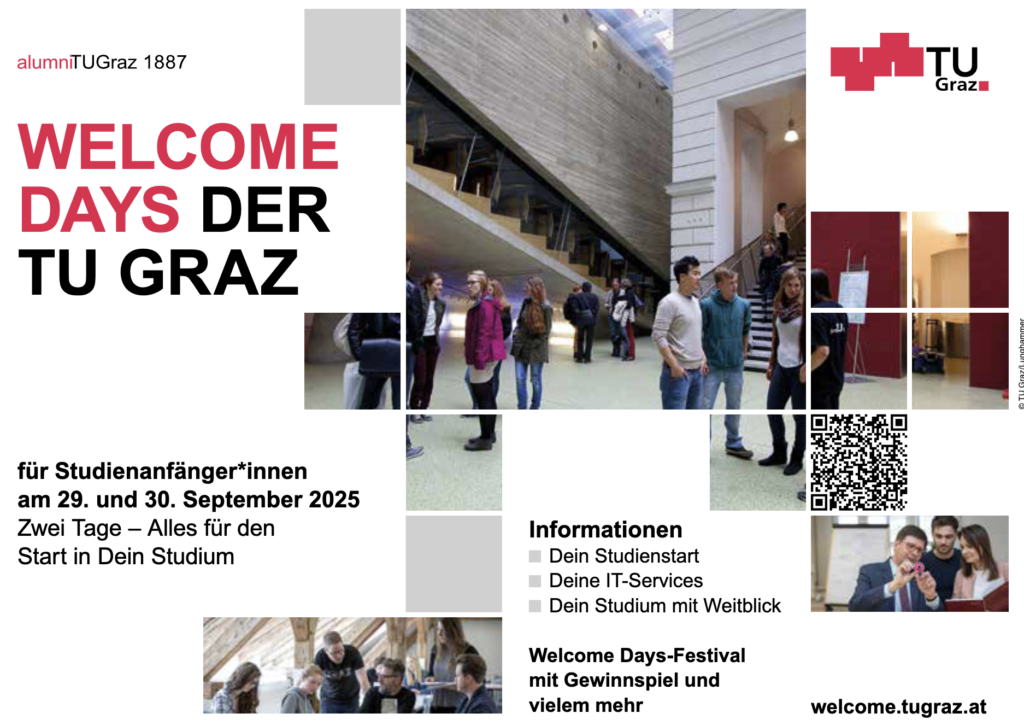
Im Rahmen des KI-Forums in Hannover hat Benedikt einen Workshop zu „Mitdenken in Echtzeit: KI-gestützte ARS in der Hochschullehre“ gehalten:
Welche Chancen bietet Künstliche Intelligenz, um Hochschullehre interaktiver zu gestalten und individuelles Feedback zu fördern? In diesem Workshop erleben die Teilnehmenden den Einsatz von KI-basierten Audience Response Systemen (ARS) am Beispiel des Open-Source-Tools echoQuiz.eu. Sie erfahren, wie explorative Frageformate die aktive Teilnahme in synchronen Lehrveranstaltungen steigern und wie Lehrende durch KI in Echtzeit didaktisch unterstützt werden können. In diesem Workshop werden gemeinsam Fragen entwickelt, praktisch erprobt und didaktisch reflektiert.
Seine Folien sind hier zugänglich:
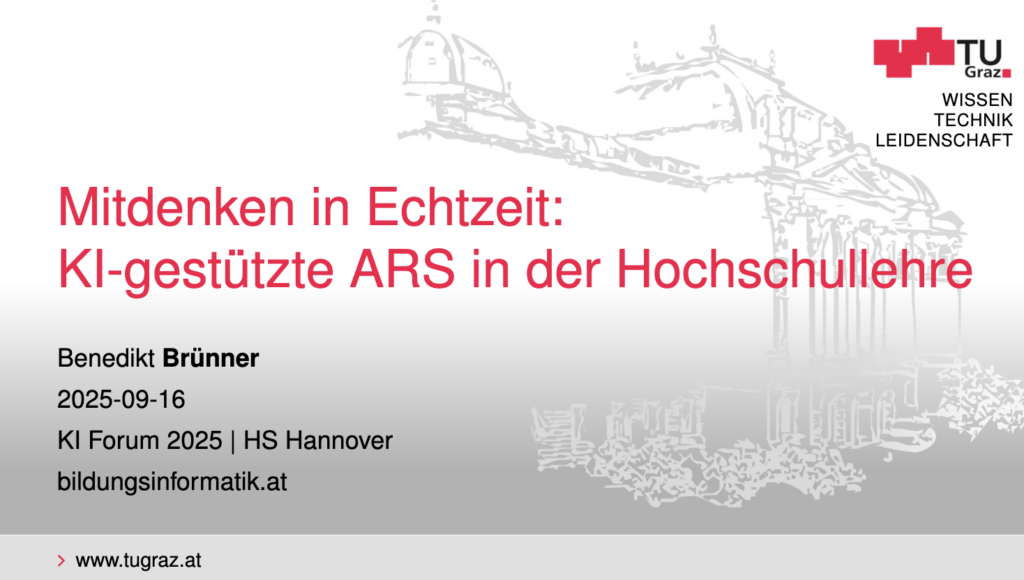
This is an impactful contributions, methodological rigor, and exceptional novelty in the research field of AI in education and Self-Regulated Learning.
Our research work titled „Empowering Self-Regulated Learning Through Technology and the Teacher’s Role – A Systematic Literature Review“ is published.
Abstract:
Self-regulated learning (SRL) has been demonstrated in numerous scientific studies as an effective alternative to traditional teaching methods, fostering individual learning processes. The added value of educational technology in supporting SRL has also been widely researched and largely validated. Within this context, the teacher plays a pivotal role. However, much of the existing research has been conducted at universities , while the secondary education level has received comparatively less attention. To gain an overview of the teacher’s influence on students‘ SRL processes, a PRISMA based systematic literature review was conducted. From an initial pool of 553 documents, 27 relevant studies were identified and analyzed. The selected studies were examined to collect data addressing the research questions, focusing on identifying effective teaching methods and essential teacher competencies for fostering SRL in technology-enhanced classrooms. Furthermore, the analysis highlights the evolving role of teachers and underscores the need for additional training to support these changes.
[full article @ publisher’s website]
[draft @ researchgate]
Reference: Geier, G., Ebner, M., Burgsteiner, H. (2025). Empowering Self-Regulated Learning Through Technology and the Teacher’s Role – A Systematic Literature Review. In: Smith, B.K., Borge, M. (eds) Learning and Collaboration Technologies. HCII 2025. Lecture Notes in Computer Science, vol 15807. Springer, Cham. https://doi.org/10.1007/978-3-031-93567-1_5
This is an impactful contributions, methodological rigor, and exceptional novelty in the research field of AI in education.
Our publication „Synthetic Educators: Analyzing AI-Driven Avatars in Digital Learning Environments“ at this year’s HCII conference is published.
Abstract:
Videos can be used in a variety of ways in learning environments today. With advances in generative AI technologies, tools such as HeyGen and ElevenLabs make it easy to create synthetic teachers, promising efficiency and accessibility. This study investigates the impact of AI-generated teaching video avatars on learners‘ emotional responses. A mixed-method approach was adopted, in which 55 participants were shown AI-generated videos and videos with real instructors. Emotional engagement was measured using FaceReader Online, along with quiz questions and follow-up interviews to gauge knowledge retention and perceptions of this educational technology. Results indicate that AI avatars effectively convey content and weakly elicit better recall rates and positive emotional responses comparable to those of real instructors. However, concerns were raised about emotional authenticity and engagement, highlighting the need for improved avatar design. The study concludes with a discussion of the potential and limitations of AI avatars and argues for their thoughtful integration to improve educational equity and learning outcomes.
[full article @ publisher’s homepage]
[draft @ researchgate]
Reference: Struger, P., Brünner, B., Ebner, M. (2025). Synthetic Educators: Analyzing AI-Driven Avatars in Digital Learning Environments. In: Smith, B.K., Borge, M. (eds) Learning and Collaboration Technologies. HCII 2025. Lecture Notes in Computer Science, vol 15807. Springer, Cham. https://doi.org/10.1007/978-3-031-93567-1_13